Secondary School Handbook 2022-23
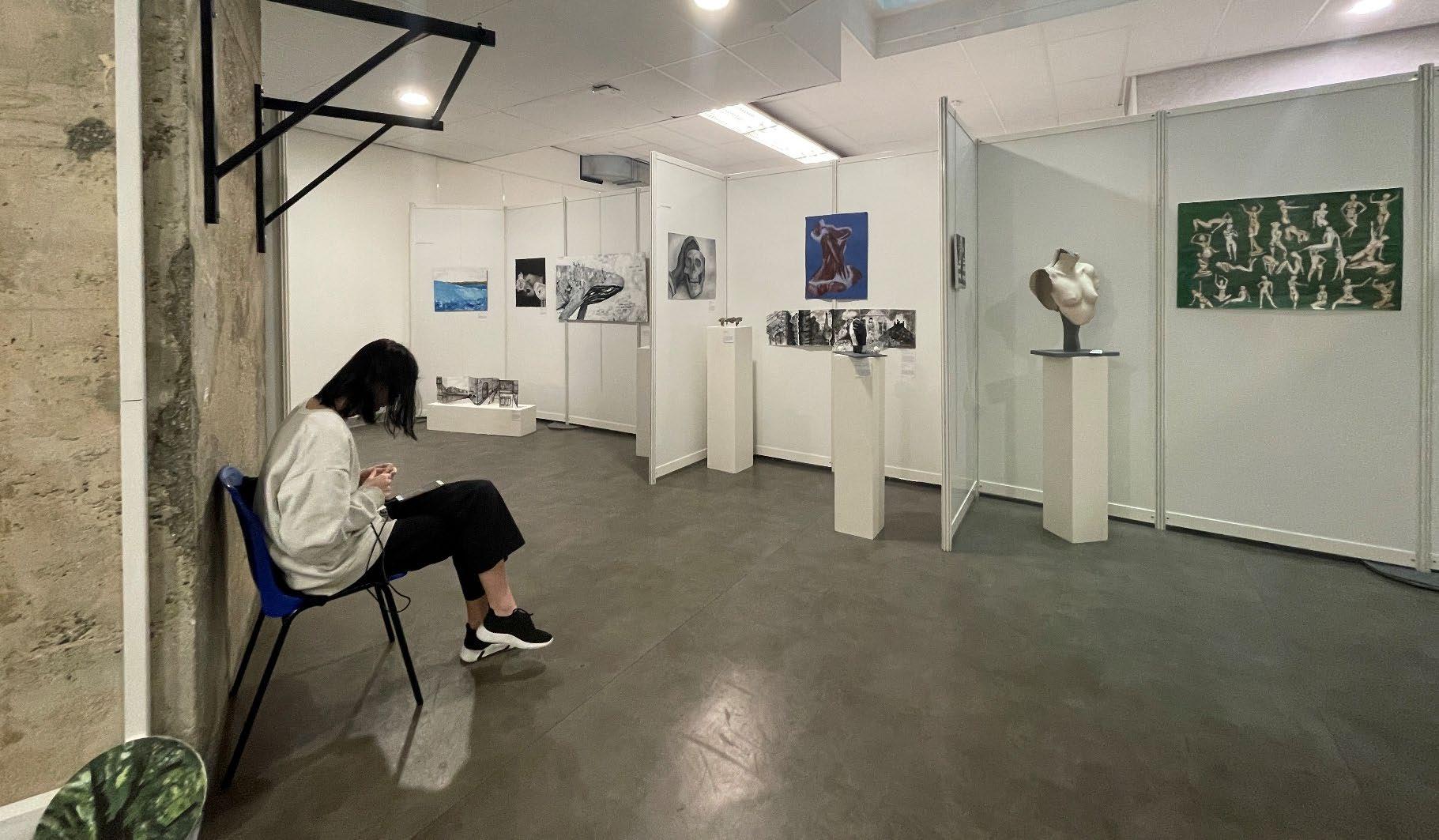
International School of Paris
Contents
Our Vision
Our Mission
Our High Quality Learning Definition
Our Guiding Statements
General Secondary School Information 7

Overview 7
Secondary School Organisation 2022 23 8
The School Day 9
Timetable 9
Start and end times 9
Leaving campus 9
Break times 10
Dress code 10
Materials and Supplies 11
Guidelines for Physical and Health Education (PHE) 12
Attendance and punctuality 14
Lateness 14
Partnership with our families 14
Parental absence 14
School cancellation 15
Extended Closure and Home Learning 15
Field trips: Paris as a classroom and overnight trips 16
Permission and information forms 16
Sports and Extended Curriculum Activities 18
The ISP Panthers 18
Extended Curriculum Activities (ECA) 18
Student Council 19
Student Wellbeing 19
Support 19
The Secondary School Student Wellbeing Team 20
Personal and Social Education programme 21
Counselling services 21
Nurse 21
Confidentiality 21
Responsibilities and Rights 22
Secondary School Handbook 2022 23 2
4
4
4
5
Health & Safety 23
Child Safeguarding Policy 23
Bullying 23
Emergency procedures 23
Medical care 23
Security 24
E safety 24
Prohibited items 24
Health and Safety 25
Seeking Support 25
Tracking Student Wellbeing 26
Specific Behavioural Concerns 27
French Law 28
Appeal 28
Student badges 28 Visitors 28
Road safety, motor vehicles, bicycles, and scooters 28
Communication 29
School information systems 29

Personal information 30
3 way conferences and student led conferences 30
University counselling 30 Support structures for students 30
Parent Teacher Association (PTA) 31 Parent volunteers 31
Alumni and guest visits to school 31
Secondary School Handbook 2022 23 3
Our Vision

Educating for complexity Our Mission
As the leading international baccalaureate school in France, we prepare our students to engage with and succeed in a complex world.
Our High Quality Learning Definition
High quality learning is a social and experiential practice. It sparks students’ curiosity and stimulates their natural creativity. It inspires them to strive for excellence, and to take ownership of their own inquiry and research. It shapes the learner and the learning community, nurturing growth and new understandings.
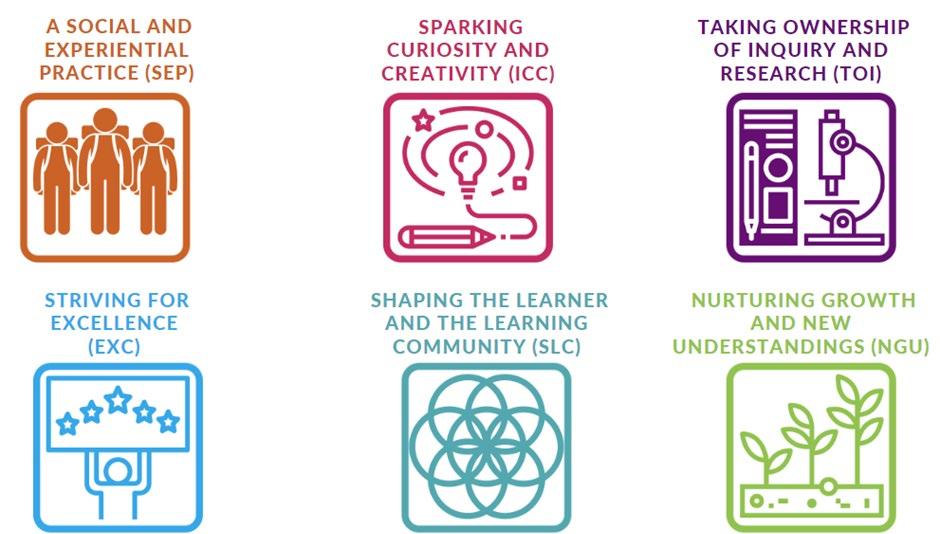
Secondary School Handbook 2022 23 4
Our Guiding Statements
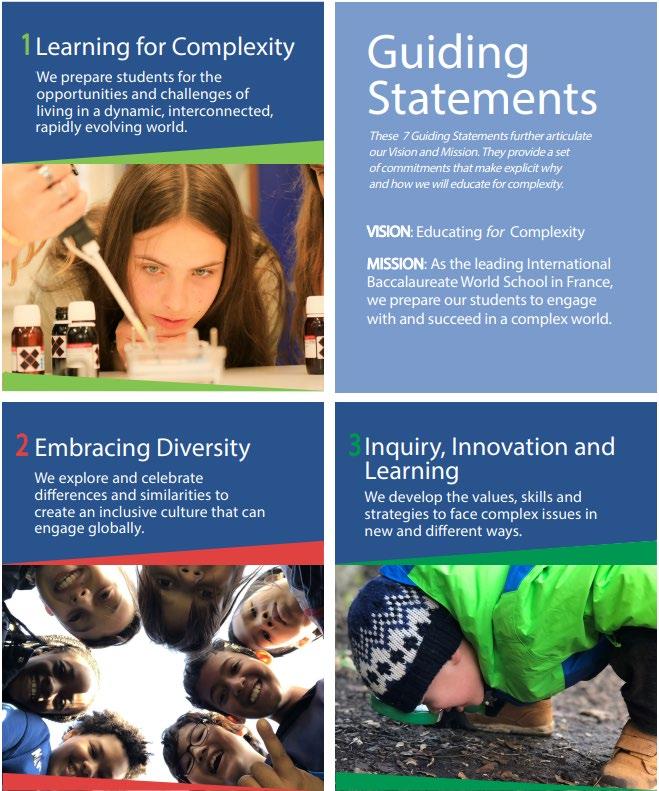

Secondary School Handbook 2022 23 5

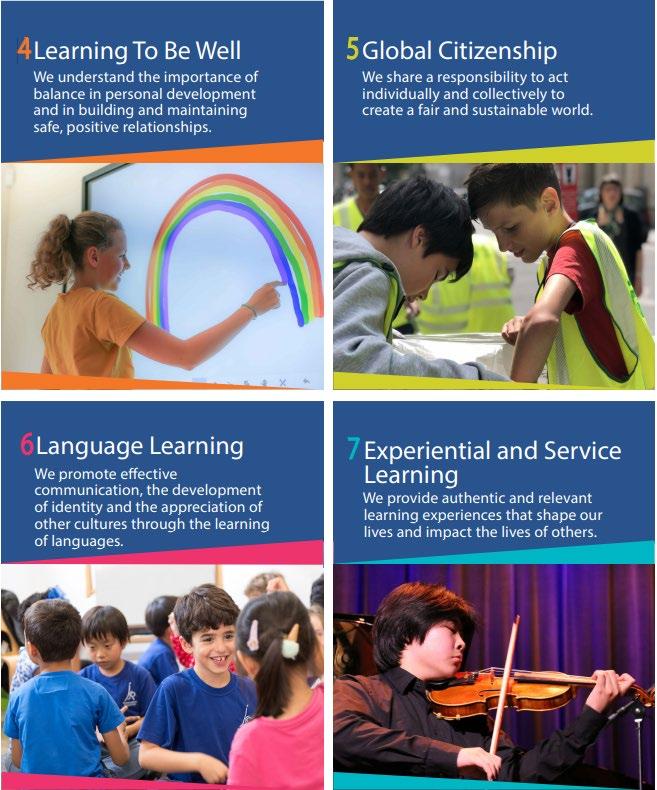
Secondary School Handbook 2022 23 6
General Secondary School Information Overview
The Secondary School at the International School of Paris is based on two campuses separated by a short walk in the 16th Arrondissement of Paris:

Middle School Campus (Grades 6 – 9) 45 rue Cortambert, 75116 Paris +33 1 81 70 35 60 reception@isparis.edu
High School Campus (Grades 10 – 12) 6 rue Beethoven, 75016 Paris +33 1 42 24 09 54 reception@isparis.edu


Secondary School Handbook 2022-23 7
Secondary Organisation 2022

The Secondary School at the International School of Paris is managed by specific teams, each of which takes responsibility for an area of the school’s operations. This chart provides some information about the relationships within, and the organisation of, the Secondary School.

Secondary School Handbook 2022 23 8
School
23
The School Day
Timetable
Monday Tuesday Wednesday Thursday Friday
Homeroom 8:50 - 9:00 Homeroom Homeroom Homeroom Homeroom Homeroom
P1 9:00 9:45 English PHE Design Humanities World Languages

P2 9:45 10:30 Humanities PSE
Break 10:30 - 10:45
P3 10:45 11:30 Design PHE World Languages English Maths
P4 11:30 12:15 Humanities
Lunch 12:15 - 1:15
P5 1:15 2:00 French Humanities Maths Arts
P6 2:00 2:45
Break 2:45 - 3:00
P7 3:00 3:45 Advisory Arts Science
P8 3:45 4:30 Maths
This is a sample timetable, for illustrative purposes only.
Lessons are scheduled over five days, Monday to Friday. The school day consists of eight 45 minute periods, some of which are combined into 90 minute double lessons. Students in Grades 6 – 10 have one half day (4 periods) of Physical and Health Education (PHE).
Please note that on the Beethoven Campus, most classes are taught in double lessons.
Start and end times
The school day begins with homeroom time at 8.50 for all students. The normal school day lasts until 16.30 each day, except on Wednesdays when students in Grades 6 – 10 finish at 14.45.
The school doors open at 8.30 and close at 17.30. Students may stay on campus for any Extended Curriculum Activity (ECA) but should not remain in school buildings after 17.30 without permission from a staff member.
Leaving campus
Students in Grades 11 & 12 may leave campus at lunchtime, and at any time in the day when they do not have a scheduled class. Students in Grade 10 may leave campus at lunchtime.
Secondary School Handbook 2022-23 9
Break
Lunch
Science
Science English
Break
French
Students in Grades 6 – 9 must stay on campus for the whole day. After the February break, Grade 9 students work with the Wellbeing Team to gain the privilege of leaving the campus at lunchtime.
Break times
Morning and afternoon break
Morning break is 10.30 10.45, and afternoon break is 14.45 15.00. During this time, students can go outside, relax inside in designated spaces, or purchase food in the cafeteria (on the Cortambert campus).
Lunch break
Lunch break is 12.15 13.15. Students in Grades 6 – 9 have access to the cafeteria on the Cortambert campus, where they can buy food each day. Students who wish to purchase food must charge their student badge online, and use this credit to pay for their meals. No cash can be used to pay for meals in the cafeteria. If a student does not have credit on their card, and would like to order a meal, they should speak to the receptionist who will ensure that they can get food. Please note that on the Cortambert campus food deliveries from external companies (UberEats, Deliveroo, etc.) are not allowed, and any family deliveries should only be on an exceptional basis.
Students in Grades 10 – 12 have permission to leave the campus at lunchtime, and can therefore buy food from local supermarkets, take away restaurants or bakeries. There is also the possibility of purchasing food on the Beethoven campus as well, from a locally sourced provider.
Alternatively, students on both campuses may come to school with a packed lunch each day. The school is equipped with microwave ovens which the students can use to heat meals. Students should bring any plates, spoons, forks, etc. that they need. After eating lunch or snacks, students must ensure that the space that they have used is left tidy and can be used by those following them. There are water fountains available for students in all buildings. Students should bring a water bottle to school with them in order to reduce the need for disposable cups.
Dress code
All students must be dressed appropriately for school activities and for the specific learning environment in line with our School Dress Code. (Link - https://docs.google.com/document/d/1XMkVqqgrLfLqXNIXiPfXoC

Secondary School Handbook 2022-23 10
pLj_4KKUttGmMP1igLUY/edit?usp=sharing)
Materials and Supplies
Student access to essential learning platforms

Technology plays a vitally important part in our pedagogical process. We use three main digital learning platforms and a host of other additional services, resources and tools to enhance every student’s educational experience.
Student accounts for these platforms are created using the least possible amount of personal data. In most cases, just the student name and an email address created for them by the school. In Secondary School, we encourage students to take personal ownership of the accounts; teachers support students throughout their educational journey to accomplish this by utilising the Approaches to Learning skills (AtLs).
The core learning platforms for Secondary are:
Google workspace used throughout the school for communication and collaboration
ManageBac the main learning platform including a parent portal
Students in all grades should bring their own laptop to school, as teachers will be expecting them to be able to access technology in lessons. If there is any reason that a student is unable to do this, please contact IT Support at itsupport@isparis.net.
Students in Grades 6 9 on the Cortambert Campus should not be using their phones during the school day, and these should normally be in their bag or locked in their locker. In exceptional circumstances, teachers may ask the students to use their phone for a learning activity, in which case they may use them in class.
Students in Grades 10 12 can have access to their phones, but they should ensure that their use or access to them does not interfere with the learning process.
All students at ISP should be aware of the positive impacts that technology can have on their learning, and be careful to access their devices in positive ways. Any inappropriate use of technology can have negative consequences on learning, and could mean that the student loses their right to use phones, tablets or computers in school.
Other equipment
Students should bring to school:
● notebooks, or ring binder files and loose leaf paper;
● pens (blue and black);
● pencils (graphite and colour);
● an eraser;
● a pencil sharpener;
● a set of basic mathematical instruments (ruler, protractor, compass, calculator, etc).
Secondary School Handbook 2022-23 11
Textbooks
The school will provide access to textbooks for the academic year, either physically or electronically. Students are responsible for looking after materials provided by the school; if books are lost or damaged, students will be charged for their replacement.
Correction fluid
The use of correction fluid is not allowed in public examinations and therefore its use is discouraged in school.
Calculators
Students in Grades 6 - 8 should have a scientific calculator.
Students in Grades 9 12 require a graphic display calculator (GDC). Parents should note that the IB Diploma Programme prohibits the use of certain calculators. Although students may use other models, the Mathematics teachers use the Texas Instruments TI 83 to demonstrate. These are widely available, and can also be purchased directly from the school.
Guidelines for Physical and Health Education (PHE)
PHE kit
The school requires all students to have an ISP PHE kit and to be appropriately dressed for PHE activities. Parents can purchase PHE kits before school starts in September by completing a PE kit order form. All enquiries should be directed to the provider, 2CParis, at: 2cparisuniform@gmail.com.

In swimming pools in France, a swimming hat and tight Lycra based swimming costume/trunks are obligatory. This is non negotiable and unfortunately if students do not bring these two things they will be unable to swim. Students may wear silicone, waterproof, swimming hats.
Transit to and from sports facilities
Students in Grades 6 – 10 will often travel off site for PHE lessons. Some PHE classes will take place at La Cour Roland (Jouy-en-Josas) and will be on one designated half day each week. In addition, we have use of other PHE facilities in Paris— such as different stadiums, basketball courts and a swimming pool and these will be utilised at different times of the year.
We trust that students will behave responsibly when representing ISP, respecting other members of the public and listening carefully to staff, especially when travelling on buses and crossing roads.
Secondary School Handbook 2022-23 12
PHE safety
All PHE teachers have first aid training. When off site they always have a first aid bag with basic supplies, such as ice packs and plasters, and a mobile phone so that they can contact the school if there are any injuries.
To support PHE safety:

● Students must be appropriately dressed for the activity.
● Students must bring their own safety equipment when advised to do so: for example, mouth guards or shin pads. Students and parents will be informed in advance of any additional equipment required.
● Students must follow the safety rules at the swimming pool
● Students must have suitable sports shoes not fashion trainers which lack support and cushioning.
● Students are not allowed to play with equipment before or after sessions without teacher permission and supervision.
● Students should not wear jewellery, including earrings.
● Students should tie up hair that is longer than shoulder length.
Secondary School Handbook 2022 23 13
Attendance and punctuality
Regular attendance is a prerequisite for success in school; conversely, those who are not in class will miss important learning opportunities. Poor attendance can lead to under achievement, and this is especially true in the senior years as courses become more demanding. It is important, therefore, that we work together with families to ensure that every child is in school, and is challenged to meet their full potential.
Detailed information about our attendance and punctuality procedures can be found here.
(Link - https://docs.google.com/document/d/1ZKm4SmURvIvm5k9I3sTeHjnpOx1Rn BXJx9TWPy111w/edit)
In particular, it should be noted that students may not receive credit for a course if they miss more than 10% of the classes for that course, and may not be able to pass the year if they miss more than 40 half days in any school year.
If a student is going to be absent from school, we ask that parents inform the school in advance by sending an email to reception@isparis.edu, and copying the child’s homeroom teacher on this email. After an absence, students are responsible for completing all missing work.

Lateness
Frequent lateness is a serious matter. Therefore all lates will be recorded on a student’s record of attendance, and the school will follow up with individual students and families to promote punctuality. This could involve the school revoking some student privileges or requiring parents and students to meet to reach agreements of punctuality. An absence is considered to exist when the student misses more than 1/3 of any given period.
Parents will be contacted by the homeroom teacher if a student is late more than twice in a given week. If the school notes that there is a recurring issue with regard to punctuality, parents will be invited to a meeting to resolve the concern.
Partnership with our families
We understand that our community is a highly mobile one and that many of us are living and working away from our extended families. Nevertheless, we do request that family travel plans respect the school calendar. It is also supportive of the school if parents schedule doctor, dentist and other appointments after school hours or during vacations. Should a student arrive late or need to leave early, parents must notify the school in advance. Students must not leave the site without permission and are required to report to reception before they leave.
If parents have concerns about their child not meeting the attendance requirements, they should contact the child’s Homeroom Teacher or the relevant Grade Level Leader. We can usually resolve most attendance issues through collaborative dialogue.
Finally, please note that long term absence through illness is always given special consideration.
Secondary School Handbook 2022-23 14
Parental absence
Please notify the school if you are planning to take a trip out of town for more than a day. The school office will require details of appointed guardians and emergency telephone numbers.
School cancellation
Should it be necessary to close the school at short notice (for example, due to COVID, severe weather, national emergency or transport strike), the school will notify every parent via email or by SMS. Should you have any concern, please check your email before calling the school office.
Extended Closure and Home Learning
Students at ISP are normally expected to physically attend classes in line with French legal requirements. ISP is not a school which offers a distance learning programme, except in exceptional circumstances, such as during the recent COVID pandemic.
If there is a situation in which classes, grade levels, campuses or the whole school are closed for any reason, ISP will offer Online Home Learning to students affected. In this case, the school will be considered to be in session, with teaching focus being on modifying the way in which the curriculum is delivered to students. Such arrangements may last for several weeks or months.
In the case where school is open as usual, but there are exceptional circumstances in which students will not be able to attend on a short term basis, the school may put in place a system whereby some Online Home Learning is available. Clear criteria for entry into this programme will be in place, and access to it will be subject to the approval of the Principal or Assistant Principal. It should be noted, however, that the main focus of the curriculum during this time will be to support students present in school, and that this programme will only be designed to support absent students in the short term. This would typically be for a period of two full school weeks, but in exceptional cases it can be extended to up to 4 full school weeks, again with the approval of school leadership. Students who do not physically return to class at the end of the agreed period will be considered to be absent from school.

Secondary School Handbook 2022 23 15
Field trips: Paris as a classroom and overnight trips
The school organises a number of field trips and those that occur outside of normal school time will require prior parental consent. During the school day, a teacher may take their class off campus for curricular activities, and these are considered to be regular class time.
Participants in school organised trips are representatives of the school at all times. As such, they are expected to abide by school rules, to follow appropriate standards of behaviour and appearance and to demonstrate concern for the wellbeing of others. Whole grade field trips and curricular activities are included in school fees; however, some events, such as Model United Nations trips, are funded separately.
At the beginning of each year the school organises whole grade overnight field trips to various locations around France. These trips are very important to our community, and support the integration of all students with their grade group. Parents are required to provide dietary and other information prior to the trip, and also indicate whether, upon return to Paris, their child may go home independently or whether they will be picked up by an adult.
All trips are accompanied by adults, at least one of whom must be a member of faculty. Staff may establish special rules and conditions in line with general school policy. Such special rules or conditions will be indicated in the trip information letter and may require written parental consent. Staff will establish reasonable curfews for students depending on their age. A full schedule of activities will be planned for all trips and thus students’ free time will be limited. Whenever possible, late night trip departures or returns will be avoided. Parents are asked to accompany their children to and from the meeting point.
Inappropriate behaviour (such as drinking alcohol, behaving dangerously, etc.), or any activity that will place themselves or others at risk, will result in the student being sent back to Paris. The parents will be asked to collect that student from the activity or they will be sent home at the parents’ cost. The student could be reprimanded by the school in other ways.
Please note that in the event of a child testing positive for COVID, parents will be required to personally arrange to pick up their child directly from the trip location, and to subsequently follow any required isolation period.
The school expects all students to abide by the ISP rules and regulations and conduct themselves on field trips with maturity and respect for others as well as for the environment around them. Failure to do so jeopardises future field trips for themselves and other students.
In addition, there are specific expectations on a number of important issues:

• Safety is paramount. Field trip participants must follow all safety rules and regulations indicated by the Field Trip Leader (FTL). A student who wilfully endangers the safety and welfare of him/herself or another will be required to leave the field trip and return home at the student’s own expense.
• Alcohol is not permitted on field trips. Students who violate this rule will be required to leave the field trip and return home at the student’s own expense.
• Tobacco, alcohol and drug use of any kind is prohibited.
Secondary School Handbook 2022 23 16
• The FTL has the authority to require students to observe an evening curfew and to respect time limits on recreation offered during the day. The FTL will set out these time limits clearly for students, and students must adhere to these.
• Students are allowed to bring music playing devices, handheld electronic games, portable computers/tablets, and mobile telephones. Please note that these items are carried entirely at the students’ own risk and they may only be used at times designated by the FTL.
• Students are not allowed to leave the field trip group while unaccompanied or without the permission of the FTL.
Permission and information forms
During the year, the school will have the need to send out parental permission or information forms for a variety of activities. In addition, permission forms may be sent out to allow students to be off campus, or at home, during examination times. These forms must be signed by a parent or legal guardian before any student will be allowed to participate in any designated activity. For students who are 18 years old (or older), these permission forms may be signed by the student themselves, except where financial matters are concerned, in which case these forms must be countersigned by a parent or legal guardian.
Sometimes these will be paper forms but in other instances, the permissions or information will be gathered electronically.
The digital authentications tools we use may depend on the nature of the information or authorisation required and could include: Google forms, Finalsite (web service provider) forms, E Questionnaire surveys, YouSign or DocuSign documents. We consider responses given through these systems to be binding.

Secondary School Handbook 2022 23 17
Sports and Extended Curriculum Activities
The school offers a number of sports as Extended Curriculum Activities (ECA), and students can sign up for these in September and January. All students are welcome to join age appropriate sports ECAs regardless of ability. We wish to encourage participation so that we can have as many students representing ISP as possible.
Commitment will be expected if a student signs up because it is very expensive to source facilities, buses and the specialist coaches. If, for a valid reason, a student cannot take part in an ECA session, they must let their coach know as far in advance as possible and should not simply send a message with another student. If a sports event is cancelled, students will be notified from an official source — the sports and extended curriculum director, the head of PHE or through our communications office.
The ISP Panthers
The school has a number of competitive sports teams, known as the ISP Panthers. Trials for these teams are announced at the beginning of each sports season, and students should check school notice boards and email notices if they wish to be considered for selection.
Extended Curriculum Activities (ECA)

The extended curriculum programme is an important part of student life. Apart from a sports programme that will rotate during the school year, there are a variety of activities, including the school play, drama, homework club, student council, yearbook, literary magazine, community service, movie nights and all kinds of music classes and events. ISP also runs a successful Model United Nations programme
If you would like any information about the extended curriculum activities programme, please contact Steven Trollope, strollope@isparis.net who, as Sports and Extended Curriculum Director, coordinates all of these activities. Please note that if an activity takes place off campus and finishes outside of normal school hours, and we have ensured that prior notice is given to parents, students will be allowed to make their own way home from the off campus site. A teacher will always be available to accompany students back to school if they wish.
Secondary School Handbook 2022-23 18
Student Council
Students in the high school and middle school are represented by their peers in the Student Council. This body consists of one student from each homeroom. The student body on each campus elects a campus president. The Student Council is consulted on important decisions regarding students in the school and is mandated to represent individuals or groups of students.
Student Wellbeing
The ISP student wellbeing team is dedicated to supporting each student by promoting positive attitudes, choices and behaviours. The wellbeing programme supports both the school’s Mission and Guiding Principles and the IB Learner Profile. It aims to:
● develop transferable skills in compassionate thinking and self management;
● develop skills to foster the peaceful resolution of conflict;
● promote the development of physical health, ethics and social behaviour;

● encourage lifelong learning;
● provide an environment where students feel secure and welcome;
● promote respect for the rights of everyone.
Our team encourages everyone in our school community to promote and maintain appropriate conduct, and this is characterised as behaviour which:
● values and respects the rights of others, including the right to learn;
● fosters a happy, safe and secure environment;
● recognizes that each member of the community is unique;
● treats others fairly;
● expects members of the community to take responsibility for their actions;
● promotes compassion and tolerance;
● develops skills for a peaceful resolution of conflict;
● values and respects others and their differences;
● addresses inappropriate behaviour;
● upholds the school’s Mission, Guiding Statements and ethos.
Support
The International School of Paris believes that education encompasses the whole child and his or her wellbeing. Teachers care for the individual student in a wider meaning than just academic growth: the primary responsibility for wellbeing lies with the individuals who are directly with the student at any particular time during scheduled activities.
Secondary School Handbook 2022 23 19
The wellbeing team will address a range of concerns; this means providing support for students who are unable to benefit fully from the Secondary School’s programmes and so are not fulfilling their potential. The team will also work with students who need support managing their behaviour or whose approach to learning may be detrimental to others. Parents will be informed of, and/or engaged with, all interventions of a significant nature. ISP promotes a collaborative working process and at any time parents may request a meeting with the wellbeing team to discuss their child’s progress.
The Secondary School Student Wellbeing Team
Student wellbeing is established and maintained through the agency of the wellbeing team, and this structure is set out as follows:
Vice Principals (Student Wellbeing)
The vice principals for student wellbeing coordinate the wellbeing team and ensure that the needs of both the individual and the community are balanced to support a positive, harmonious learning environment. The VPs and the wellbeing team have the choice of pursuing any combination of advisory, mentoring, counselling (including therapeutic) or community building strategies to support individual student needs and the best interests of the learning community. A student’s failure to maintain ISP’s expectations for appropriate conduct may also lead to the employment of structured sanctions.
Grade Level Leaders and the homeroom team
The homeroom team provides a regular daily contact time for each class with one teacher dedicated to their wellbeing. Each student will have a homeroom teacher, a teacher who can provide a range of general support strategies for everyday concerns (academic or personal/social) as well as being able to mediate issues between the student/parents and the school (for example, helping to schedule 3 way conferences).
Contacting a member of the team
In most cases, the homeroom teacher would be the first point of contact for parents with inquiries about their child’s academic progress. The homeroom teacher will best know the students and will have a detailed knowledge of their daily routine. For example, the homeroom teacher will be able to request information from teachers/administrators about the curriculum or gather information about a student’s progress or address social concerns. If parents need to speak with a homeroom teacher they should call the school to schedule an appointment or send an email to the teacher concerned.
If families have specific academic concerns, they are encouraged to contact that subject teacher in the subject of concern.
All ISP staff members have email addresses and parents can contact them directly about issues which concern their child. The Faculty and Staff Directory can be accessed through the contact information and directory page of the ISP website, www.isparis.edu, in the Parent Portal section.

Secondary School Handbook 2022-23 20
Personal and Social Education programme
The Secondary School has a curricular PSE (personal and social education) programme. The content of the PSE programme addresses the following areas:
● Peaceful resolution of conflict, social interactions, relationships;
● Subject choices for school programmes, careers and university guidance;

● Health and sex education, drugs and substance abuse;
● School life and family life;
● Self awareness;
● Self management skills;
● Citizenship, the global world and religions.
The programme is a dynamic one, allowing us to address issues which arise throughout the year, either to support individual students who may not meet our community’s expectations, or to support groups of students when difficult situations arise. This process could include the development of an Individual Learning Plan, a negotiated structured learning map to address identified needs and/or concerns. The team aims to promote healthy, positive life choices and thus integrate students into our community through shared understanding, dialogue and cooperation.
Counselling services
The school has a full time counsellor, dedicated to dealing with emotional, behavioural, social and psychological issues. Any student may approach the counsellor for support. Similarly, parents may request this service for their children. The school may also initiate a counselling programme as a response to legitimate and/or shared concerns. Where necessary, engagement with our counsellor (or recommended proxy) may be a requirement of enrolment or a required response following a student’s failure to maintain ISP’s expectations for appropriate conduct.
Nurse
The Secondary School nurses are not only available to meet students’ immediate medical needs but also to advise the Wellbeing Team on health related issues. The nurses also liaise with external organisations and ensures that ISP meets all our medical obligations with regard to French law. Our nurses also contribute to our Personal and Social Education programme on relevant issues such as sexual health education, and substance use. Our nurses also carry out health checks on each student every two years, and test eyesight, hearing and other potential areas of concern. Please see more information below about our approach to medical care.
Confidentiality
Any counselling or mentoring programme initiated by the school or parents will have agreed upon and clearly understood boundaries of confidentiality. Any information divulged and required to be addressed by the Wellbeing Team will be treated as confidential within the Team, except when a failure to disclose information would be detrimental to that student’s wellbeing or education; or would mean
Secondary School Handbook 2022 23 21
that ISP would be in breach of the law; or that ISP would not meet its responsibility acting in loco parentis
Responsibilities and Rights
All students and members of the community have rights and responsibilities, as follows:
Students have a right to:
● learn and play in a safe and clean environment;
● learn and play in a supportive environment;
● be respected;
● access adequate and appropriate facilities;
● express their opinion;
● express themselves in an appropriate manner;
● privacy;
● learning experiences which cater to individual requirements;

Parents have a right to:
● be respected by staff, students and the wider community;
● be welcomed at our school;
● have their child’s full potential realised within the limitations of available resources;
● meet with staff and discuss issues relating to Secondary School policy and procedure, their child’s progress and reports;
● have their opinions valued.
Students have a responsibility to:
● actively promote safe and clean practices whilst at school;
● participate in school activities to the best of their ability;
● respect the rights of others;
● care for school facilities in a respectful manner;
● tolerate opinions of others;
● express themselves in a socially acceptable way;
● allow others their privacy;
● respect the learning styles of peers;
● report perceived bullying.
Parents have a responsibility to:
● show respect towards staff, students and the wider community;
● model appropriate behaviour, including language;
● be available to discuss their child’s progress
● ensure their child is sent to school prepared to be involved in the formulation and support of Secondary School policy;
● support programmes developed by the Secondary School;
● express themselves in a socially acceptable way;
● allow others their privacy;
● respect the learning styles of peers;
● report welfare concerns.
Secondary School Handbook 2022 23 22
Health & Safety
The school emphasises the importance of safety in all aspects of our operations and interactions. The wellbeing of our community, and particularly our students, is critical.
Child Safeguarding Policy

ISP is committed to maintaining the highest standards in the area of child protection and has a very clear Child Safeguarding Policy addressing the school’s and individuals’ responsibilities to protecting the children in our care. If any member of the community has any questions or concerns about child protection or our policy regarding it, they should contact the Vice Principals for Student WellbeingMs Fiona Lee (Middle School, flee@isparis.net), Mr Michael Kopp (High School, mkopp@isparis.net),the Assistant Principal, Ms Amy Bowley (abowley@isparis.net), or the Secondary School Principal, Mr Damian Kerr (dkerr@isparis.net).
Bullying
ISP has a very clear stance on bullying. We state explicitly that bullying is not tolerated in any form, or at any level.
Emergency procedures
Fire drills and evacuation/lockdown exercises (typically unannounced) are carried out regularly throughout the year. Students and visitors should ensure that they are familiar with the different procedures that are posted around the school campuses. In the event of an emergency, students and visitors should always follow the instructions given by the security guards and members of staff.
Medical care
If a student becomes unwell while at school, they must go to the sickroom on campus. The School Nurse, or a nominated member of staff in the case of their unavailability, will evaluate the student’s medical condition. No student should leave school because of illness without speaking to the nurse or their replacement, and students should also consult the nurse before contacting their parents to request to leave school. The school will notify the student’s parents if a decision is made to send a child home.
Please note that if a student has a minor complaint, the School Nurse — and only the School Nurse — may administer medication. In the case of a more serious concern, the school will contact the parents and/or the SAMU (emergency medical service). In the case of an emergency, the school will contact the SAMU and will make medical decisions based on the doctor’s recommendations, including surgical intervention. Parents will be systematically informed if the school contacts the SAMU about their child’s health, but it may not always be possible to do this before contacting emergency services.
The school provides medical insurance for all students while they are in our care, although, depending on circumstances, this insurance may not cover all medical costs.
Secondary School Handbook 2022-23 23
Security
We do all we can to offer a secure and safe environment. The school provides lockers for all students, and we strongly advise students to store their belongings in their lockers with a secure combination or key lock. We have security cameras in all our buildings, and a secure pass system on all external doors. The school cannot be responsible for any cost arising from the loss or theft of personal items on the campus. For safety reasons, any unattended belongings may be removed.
Students are asked not to bring unnecessary valuables into school, but if they do, these should not be left in schoolbags or in changing rooms, for example, during PHE. Rather, they should be locked in their lockers before the lesson begins. Occasionally, a student may wish to bring a valuable item into school as part of a project or other piece of school related work, and, in these circumstances, this may be given to the school reception for safekeeping.
All students’ belongings should be labelled with their name. A lost and found box is kept on each campus and we also ask students and others who find valuable items to hand these in to reception. If a student loses an item they should first check in the lost and found box and then speak to the receptionists to see if it has been given to the receptionist.
At specific times during the school year, any uncollected items are sent to a charitable organisation. Parents will be informed of this via email.

E safety
At ISP we take e safety very seriously. E safety is incorporated into the Personal and Social Education curriculum and workshops are held during the year for parents and students.
In addition to these we have support tools for teachers and students including a firewall optimized for educational use, allowing age appropriate content filtering. For the system to be effective, students must be accessing online content through the school’s wireless and internet connections, not through personal hotspots or alternative VPNs. We make this a key rule in our acceptable use of technology guidelines.
Secondary School Handbook 2022 23 24
Prohibited items
Students should not come to school in possession of anything which may pose a danger to themselves or others. Specifically, knives, other weapons and imitation weapons are forbidden. Students should not bring prescription or other drugs, alcohol, tobacco, or vaping materials to school.
Health and Safety
If a student’s wellbeing is at immediate risk, the High School will notify parents and call the SAMU (the French emergency medical services). Should the Wellbeing Team consider a student to be unfit to attend school or a school event (such as field trip), then parents may be asked to take a student home. Please note that the school has a right to search students and their belongings at any time during the school day to safeguard the wellbeing of the community.
Seeking Support
Should a student approach the school seeking support for the consequences of risky behaviours and/or choices, the school’s primary responsibility is for the wellbeing of the student. The school will identify as quickly as possible the parameters of the support we can meaningfully offer and communicate these with the parents or carers of the student and those colleagues who are directly involved in the wellbeing of the student. Assurances can be sought to safeguard this support as a wellbeing process and not a disciplinary issue.

Secondary School Handbook 2022 23 25
Tracking Student Wellbeing
So that students, parents and teachers can understand and track the work being carried out by the Wellbeing Team, every student event that requires a staff intervention is allocated a descriptor, from Level 1 (minor) to Level 5 (most serious). Each intervention at Level 2 or above is recorded for a minimum of one school year and at each level there are different responses, as indicated below:
Level 1



















Minor concern Intervention: Advisory meeting with teacher or homeroom teacher
Moderate concern or repeated Level 1
Level 2
Intervention: Advisory meeting with teacher and homeroom teacher; parents informed; reflection required; mentoring considered; structured loss of recreational time.

Level 3
Serious concern or repeated Level 1 or 2
Intervention: Advisory meeting with homeroom teacher and head of grades; parents informed and engaged; reflection required; mentoring and/or counseling may be required; formative, structured loss of access to learning time.
Level 4
Very serious concern or repeated Level 1, 2, or 3.
Intervention: Advisory meeting with vice principal, and principal or assistant principal; parents informed and engaged; reflection required; mentoring and/or counseling required; formative, structured loss of access to learning time; re registration may not be offered.
Level 5
Most serious concern or repeated Level 1, 2, 3 or 4.
Intervention: Advisory meeting with vice principal, principal and head of school; parents informed and engaged; re registration may not be offered; student may be immediately and/or permanently withdrawn from learning community.
Secondary School Handbook 2022 23 26
Specific Behavioural Concerns

The Secondary School has shared expectations for appropriate student behaviour. The behaviours below are not exhaustive but cover a range of issues that the Secondary School may have to address such as drug abuse, substance abuse, violence at school, concerns about alcohol and tobacco, bullying and personal safety. Please note that repeated failures to manage behaviour will automatically raise the level of concern.
Minor concern
Level 1



















For example: demonstration of minor violence/aggression (pushing, verbal aggression); minor demonstration of disrespect to people or property (disrespect for ISP school rules).
Moderate concern (or repeated Level 1)
Level 2
For example: smoking tobacco, possession of smoking materials/paraphernalia (including electronic cigarettes); demonstration of moderate violence/aggression; low level bullying; passive acceptance of bullying (a student who knowingly chooses not to protect a victim or seek help for a victim of bullying); clear demonstration of disrespect to people or property; bringing any look alike weapon to school; academic dishonesty.
Level 3
Serious concern (or repeated Level 1 or 2)
For example: possession, consumption, distribution, or sale of alcohol; serious demonstration of violence/aggression (fighting/assault); serious bullying or intimidation; serious disrespect to people or property (theft, intentional damage to property, verbal sexual harassment, flagrant or willful disrespect for community members or rules); use of language which undermines ISP’s commitment to diversity and inclusion even when the intent is humorous; bringing any weapon, or potential weapon, to school.
Level 4
Very serious concern (or repeated Level 1, 2 or 3)
For example: possession or consumption of illegal drugs, illicit prescription medicines, or abuse of dangerous substances; serious physical assault, bodily harm; physical sexual harassment; repeated, inflammatory or abusive use of language which undermines ISP’s commitment to diversity and inclusion; serious academic dishonesty.
Level 5
Most serious concern (or repeated Level 1, 2, 3 or 4)
For example: distribution or sale of illegal drugs, illicit prescription medicines, or dangerous substances; life threatening violence; sexual assault; serious breach of ISP’s commitment to diversity and inclusion.
Secondary School Handbook 2022 23 27
French Law

If a concern is serious enough under French Law to be reported to authorities, the Wellbeing Team will manage this with the prior approval of the head of school and, where appropriate, with due notification to parents. In this respect the High School will act vigorously to protect all individuals in the community from drugs, violence, weapons, sexual harassment or theft.
Appeal
For any concern, the student may appeal the level determined and/or the consequences. In the case of level 5 concerns the Board of Trustees must be informed. The only purpose of an appeal to the Board of Trustees is in the case of procedural defects. Our work presumes full collaboration from all parties; in the case of non collaboration, the High School does reserve the right not to re register the student for the following school year.
Student badges
All students should come to school each day wearing their school badge on the school issued lanyard so that they can be easily identified, if necessary. Students should badge into the buildings when they enter and a record is kept of their presence for fire evacuation procedures.
Visitors
All visitors invited to the campus by students are required to report to the relevant reception, where they will be asked to sign in. They will then receive a visitor’s badge that must be worn and displayed at all times.
Road safety, motor vehicles, bicycles, and scooters
All students should use marked road crossings provided when crossing the roads during or between school activities. Students may choose to come to school by bike, or by scooter; however, students may not use their own mode of transport during school activities. Scooters and bikes left in school during the day should be securely locked. All use of bicycles and scooters must follow the French code de la route
Secondary School Handbook 2022 23 28
Good communication between home and school is essential. The following information will assist you in identifying where information may be found and with whom you may wish to speak.
School information systems
The school strives to model sustainable development and this means taking active steps to reduce our carbon footprint. Therefore, we have paperless communication whenever possible, and this can be summarised as follows:
● ManageBac: ManageBac is the school’s curriculum management system and a vital communication tool for all members of our community. Secondary School students, teachers and parents all have individual ManageBac accounts. Parents are also given access to student reports via ManageBac.
● Google email: The school provides every student with a personal Google mail account, recognizable by the @isparis.net address. This account is an essential communication route between students and teachers, especially as it integrates with a range of Google applications that are in frequent use in the classroom.
● Emails from “ISP NEWS”: The school will email parents with news about specific events, special announcements, field trips or changes to our normal routine. In addition, all notices about electronic communication, including login details for the ISP Parent Portal (see below), are sent by email, so it is very important that your email address is valid and that you check your email account regularly for school news. Please note that the sender for most ISP related regular mass emails will appear as “ISP News” or “IT Support”.
● ISP Parent Portal: ISP provides a resource for parents seeking more detailed information about school activities. Parents are strongly encouraged to login to this secure area of the school website. The Parent Portal contains an electronic directory of staff contacts, photos of recent events, curricular and school handbooks, learning resources, and much more. The login details will be sent at the beginning of the school year. In case you misplace your login details, you can retrieve a link to change your password by clicking on the Forgot Username or Password link on the login page.
● Weekly newsletter: This is a summary of upcoming school events. In addition, there are links to the latest headlines, as well as various important documents and forms. We strongly recommend that you use this resource to keep up with school events and activities.
● ISP website: The school website (https://www.isparis.edu/) provides details of major events, recent news, and up to date curricular information. Some of this is password protected, and not accessible to the general public.
For further information about ISP’s communications systems or to provide feedback or suggestions for improvement, you are welcome to contact our communications team at communications@isparis.edu.

Secondary School Handbook 2022-23 29 Communication
Personal information
It is very important for the school to have complete and up to date information about all of the students and those whom we may need to contact in case of emergency. Please send an email to reception@isparis.edu in the case of changes or additions to any of the following details:
● home address or telephone number;
● parents’ and other contact details, especially mobile phone number and email addresses;

● medical information including vaccinations, operations, allergies and anything else of relevance.
For reasons of health and safety, parents should inform the school of any medication that their child is taking. For any health related information, please also copy ispnurse@isparis.net.
3-way conferences and student-led conferences
Parents are always welcome to arrange conferences at school and, likewise, the school may initiate a conference with parents at any time during the year. Mid way through the first academic semester, time is set aside for 3 way (student, parent and teacher) conferences. During the second semester, the school organises student led conferences. Conference bookings are made online and parents will receive guidance in this process prior to each conference date.
University counselling
The school has several university counsellors who specialise in different regions of the world. All applications should be given to the university counsellors at least ten school days before the deadline and references from teachers should be requested at least 15 school days before they are required. While it is currently popular to apply to an increasing number of universities, it is the student’s responsibility to ensure that the research needed in making their university choices is undertaken before an application is sent. The school will help students with up to eight applications per country. Please note that the school does not pay for express delivery of application documents. For a detailed list of recent university acceptances, please visit ISP’s university counselling webpages
Support structures for students
Each student in the Secondary School is a member of a homeroom of between 16 and 24 students. Each homeroom is monitored by the students’ homeroom teacher who has day to day responsibility for the students in his or her group. Students who have a problem, either academic or personal, can bring it to the attention of their homeroom teacher, or their head of grade, or another member of the Wellbeing Team, or the relevant curriculum coordinator depending on the nature and seriousness of the problem. Students can also ask their Student Council representative to act on their behalf.
We recommend that if students or parents have a concern about any issue concerning a member of staff, they should first try to resolve the problem with the individual concerned. If the matter is not
Secondary School Handbook 2022-23 30
brought to a satisfactory conclusion, then parents or students should bring it to the attention of the homeroom teacher, who will attempt to work with all those involved to find a solution.
Parent Teacher Association (PTA)

The school works closely with the PTA in order to understand the needs and perspective of the parent body. Five yearly meetings take place between the Secondary School Leadership Team and the PTA Grade Representatives. These consultative meetings are held in a spirit of openness, allowing both constituencies to understand the other’s reasoning and perspectives on different school matters.
Parent volunteers
We like to involve our parents in the daily life of the school. Our parent population is a rich sea of experience from which every student can benefit, and we welcome parents’ input. These are just some of the ways in which you can participate: join the Human Library; give a presentation on your country; demonstrate your special talent in music or crafts; chaperone social events; assist with the work of special needs, English as an Additional Language (EAL), French and other languages; share your career experience with students; offer a placement for our Work Experience programme; host students from visiting schools. This is not an exhaustive list. If you have time to spare and an idea of how you might help, please contact the school.
Alumni and guest visits to school
Former students or friends of currently enrolled students may make one day visits with permission of the Secondary School Principal, the Assistant Principal, or the Vice Principal for Student Wellbeing. Requests must be made at least five days in advance, and all guests must identify a currently enrolled student who will be responsible for him or her during the time spent in school. The accompanying student is also responsible for ensuring that teachers are informed ahead of time to ensure that their visit causes no disruption to lessons. Visiting students will need to wear their visitor badge at all times. Prior to the visit, parents must complete and return an insurance waiver which can be found on our website. Please note that at certain times in the school year, for safety, organisational or security reasons, we are not able to accommodate student guests.
Secondary School Handbook 2022-23 31
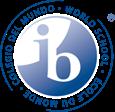



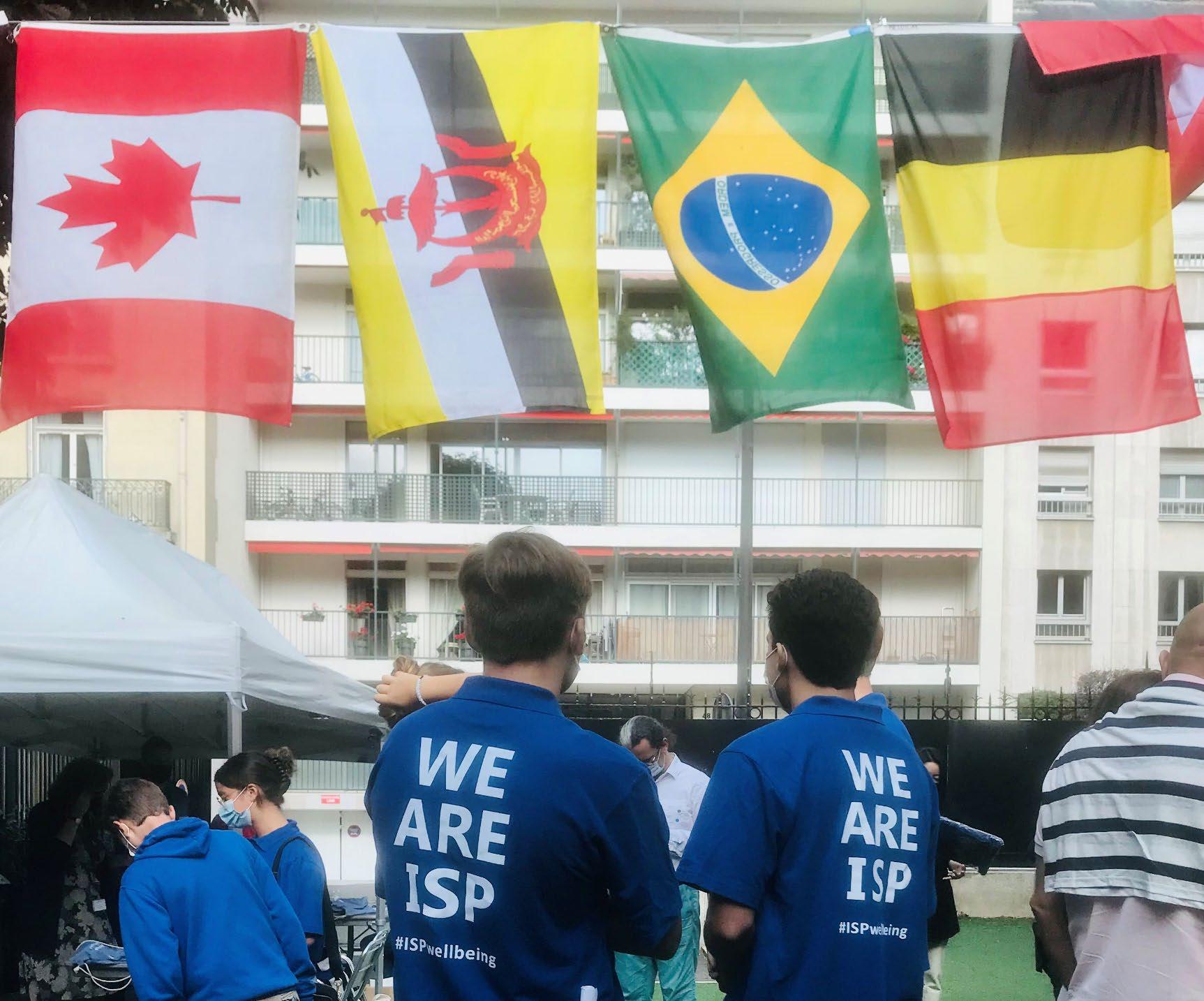
High School and Main Reception 6 rue Beethoven 75016 Paris, France Tel: +33 1 42 24 09 54 Middle School 45 rue Cortambert 75116 Paris, France Tel: +33 1 81 70 35 60 Primary School 96bis rue du Ranelagh 75016 Paris, France Tel: +33 1 42 24 43 40
